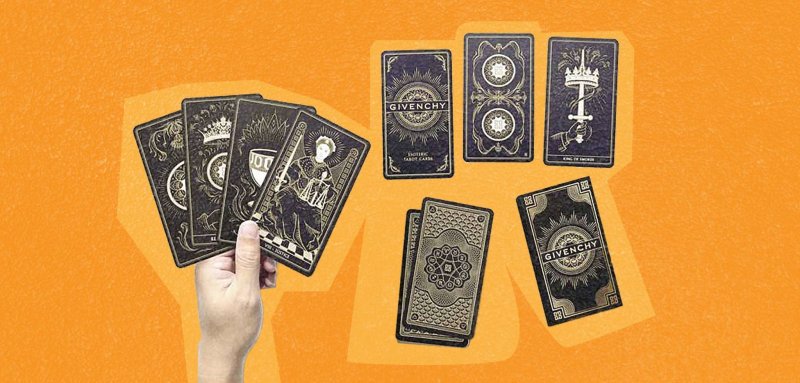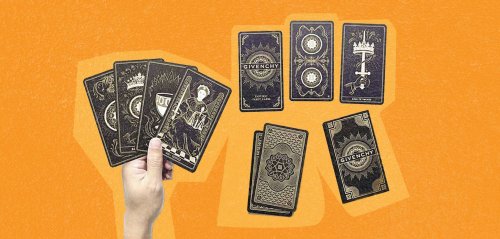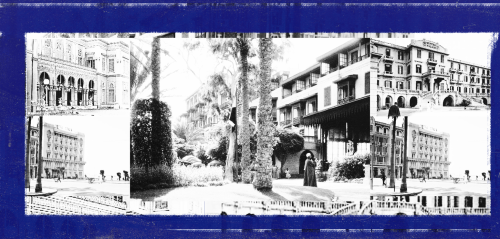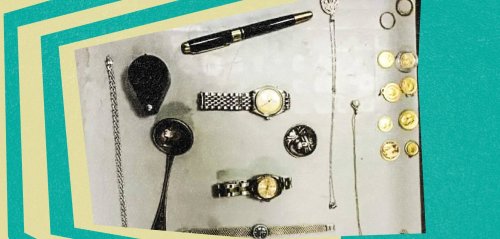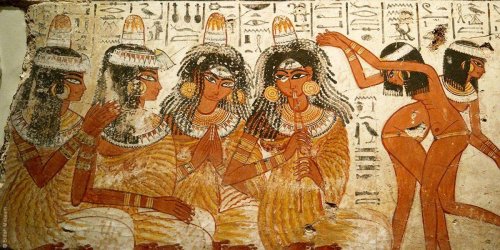At first glance, a popular corner in the famous library appears to visitors passing by to be a corner dedicated to children's books. It extends from the floor to the ceiling at the entrance of the library overlooking 26th July Street in Zamalek Island. It appears to be colorful books with strange illustrations at first glance. However, upon closer inspection, it becomes apparent that what had first seemed like books were actually collections of Tarot cards, along with their guides for reading and interpreting them. This indicates that the most famous library, known for its appeal to the Gen Z generation (those born in the late 1990s), found that these Tarot cards and their guides were popular enough to warrant dedicating one of the most prominent corners on the library's facade to them.
"Some people are obsessed with it," described one of the customer service employees at the library when asked about the popularity and interest in Tarot cards. These cards, which resemble playing cards known as "El Kotshena" in Egypt, may appear familiar to many Egyptians who know nothing about tarot.
However, there are differences between the Tarot and "El Kotshena," not only in the various tarot card images and illustrations but also in their evolution from mere playing cards and a form of entertainment to becoming persuasive tools that have led many people around the world to shape their lives and decisions based on 'reading' the cards and the warnings or predictions offered by the reader (interpreter). But the question that comes to mind here is: Why is Tarot gaining popularity in Egypt now, specifically?
Tarot evolved from mere playing cards and a means of entertainment, to persuasive tools that have led many people worldwide to shape their lives and decisions based on 'reading' the cards. But what comes to mind is: Why is Tarot gaining popularity in Egypt now?
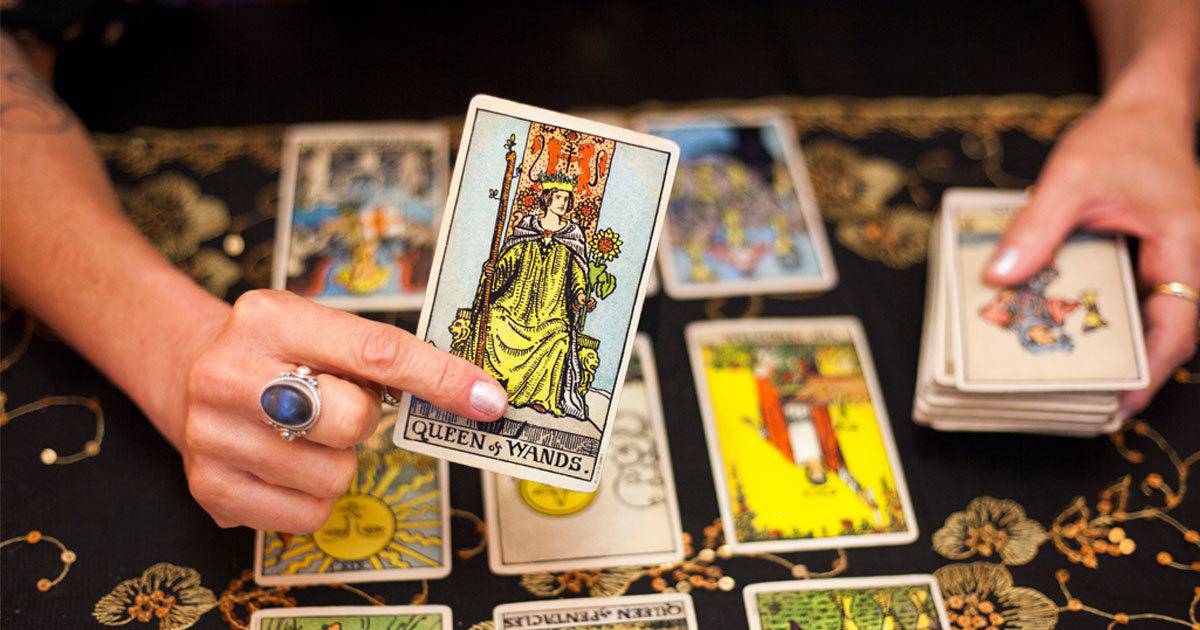
A brief history of the tarot
According to the Metropolitan Museum of Art's guide, the earliest confirmed mention of the Tarot traces back to the year 1440 (13th century) in the regions surrounding the kingdoms of Venice, Florence, and Milan, which later became cities in Italy as we know them now. The Morgan Library & Museum in New York preserves some remaining cards from the "Visconti-Sforza Tarot" deck, illustrated by Bonifacio Bembo for the game "Tarocchi". However, the museum confirms that the "game" of Tarot at that time had already reached a high level of complexity in its cards and meanings, indicating that its origin as playing cards began much earlier than that.
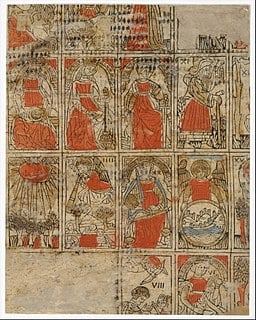
The Metropolitan Museum believes that the use of Tarot cards for fortune-telling and future prediction began in the 15th century. Each card had acquired its meanings in the 18th century, which witnessed the contribution of the French Freemason Antoine Court de Gébelin in analyzing the cards. It was believed that the symbols on the cards were derived from Pharaonic myths, and some claimed they were influenced by the Babylonian civilization. Some of its practitioners believed that the system was derived from the rituals of Indian god priests. However, regardless of the various Eastern civilizations attributed to Tarot readings, the confirmed archaeological evidence indicates that the cards originated in Italy during the Middle Ages and evolved into a means of fortune-telling during the Renaissance, spreading from the current cities of Italy to Europe. The development continued until the French astrologer Jean-Baptiste Alliette authored a guide for its use in divination.
The astrological interest in Tarot grew, and it became associated with the secrets of Kabbalah (a mystical aspect of Jewish religion) and linked to magic and astrology. Tarot cards are divided into two groups: the Minor Arcana, consisting of swords, coins, and cups, each numbered from 1 to 10, and the Major Arcana, which depict various characters and natural elements, some of which are related to the Minor Arcana (such as the Queen of Cups and the King of Swords, etc.).
According to Ahmed Abdel Aziz, the branch manager of Diwan Zamalek Library, the "Original Rider-Waite deck is the foundation from which everyone starts their Tarot reading, based on their teacher's recommendation. The remaining 78 cards differ only in their illustrations, and the client chooses based on their personal comfort and attraction."
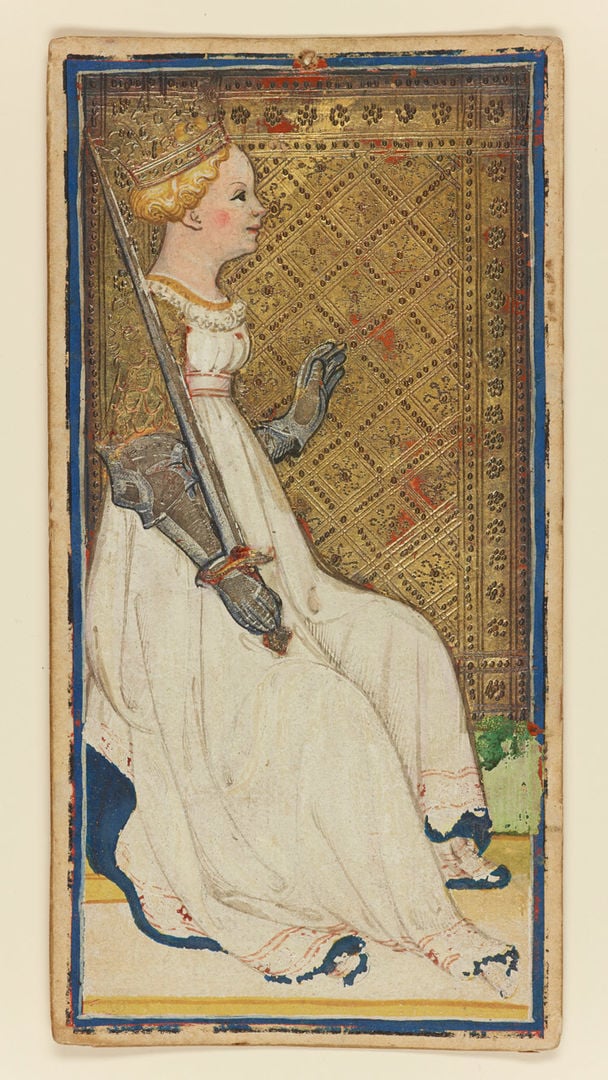
"Queen of Swords" from the Bonifacio card deck
The impact of a crisis
Abdulaziz, who manages the branch of the library where our report began, says that the decision to dedicate that corner was prompted by the library's observation of a surge in demand for Tarot cards that started during the "corona and curfew period". The young manager explains it by saying, "Previously, people used to rely on numbers and scientific statistics to determine the outcome of their endeavors, but the COVID-19 crisis proved that an unseen factor can change all possibilities and life plans. This led to considering the possibility of using alternative methods such as Tarot cards, and we discovered that there was a significant interest and demand after testing out a small quantity."
In the search for reassurance, many spoke of the Tarot and how it helped them "overcome their depression", during a period when the world was grappling with various challenges, in line with the idea that "interest in the supernatural is a natural human drive"
'A drowning man will clutch at a straw'
Despite the normalization with the coronavirus situation in Egypt, Tarot reading and learning continued both locally and globally. Even among a generation that is mostly distant from practices like reading palms, coffee cups, and tea leaves, they found themselves "drowning" and searching for any means of reassurance and comfort, even if it manifested in the occult.
Among those who have turned to Tarot reading is young Reem Shawqi, a resident of an Egyptian province. She tells Raseef22, "I believe in the science of energy and its positive and negative manifestations. However, to protect myself from negative influences, I focus solely on the positives."
Regarding her relationship with Tarot reading, she explains, "Tarot changed my perception of things. But when I first sought solace in it, I felt like a drowning person clutching at a straw. I wanted something to reassure me that the future would be better. So, I started following it, and to my surprise, some of the things said in the readings actually happened and manifested in reality. It's not fortune-telling, but rather reading energy."
The sense of drowning and grasping at a straw were also the starting point for Fareeda Azmy to turn to Tarot a year ago when she was facing a problem and tried to confront it "through various spiritual and mental means." She says, "I was searching for any sign or solution, even in dreams or horoscopes. Until one day, I was watching a YouTube video, and it was about Tarot readers, and what was said in it coincided with what I was going through, so I was immediately drawn in."
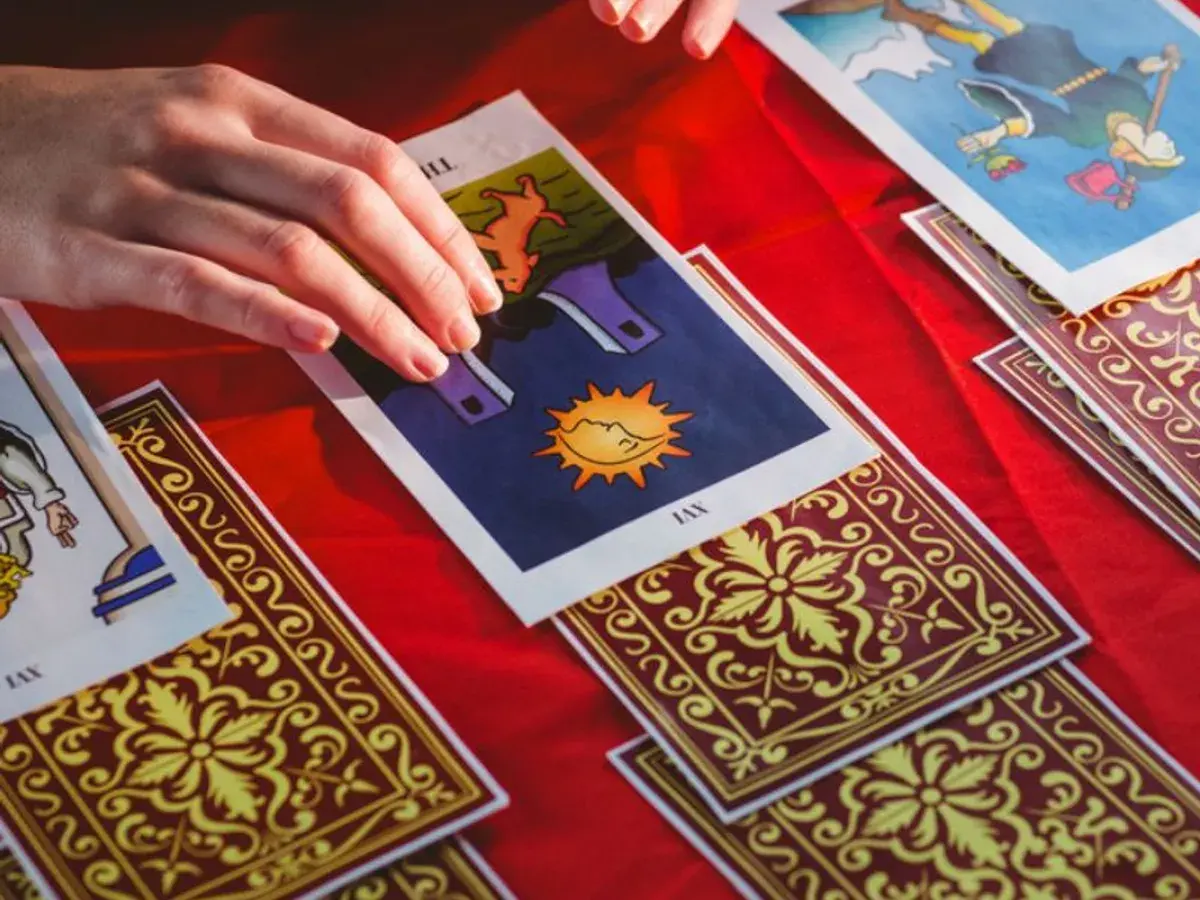
Fareeda continues to Raseef22, saying, "On the peak day of my problem, I contacted a Tarot reader. I was like a drowning person clinging to a straw, to the extent that I paid 800 Egyptian pounds for a five-minute Tarot reading video. I did it solely for the sake of reassurance."
In the search for reassurance, Reem and Fareeda were no different from others who spoke of the Tarot and how it helped them "overcome their depression", during the same period when the world was grappling with various challenges and problems. This aligns with what researchers at the University of Arizona in the United States have stated, that "human interest in the supernatural is a natural human impulse." It has even led to the emergence of works considering it as a "means of healing in difficult times."
For awareness and entertainment
In addition to what the university mentioned, the media has shown interest in what appears to be an international phenomenon regarding the spread of Tarot reading. The British newspaper The Guardian stated in its report that the spread of Tarot reading has transformed from something mysterious and magical into a means of self-care.
This is evident in Reem's experience, who says, "During the COVID-19 period, I decided to try a private reading session, and the session lasted for three hours. Although I didn't provide any prior information about myself, I received insights into many things that had happened to me. Not in great detail, but in general terms, such as problems at work or within the family."
For Nabeela Ali, the Tarot opened another door — entertainment. Despite being thirty-six years old, she never believed in "palm reading or cup reading," but she believes in metaphysics and its manifestations, and that "not everything has been discovered and explored." She now sees Tarot as a means of "exploring human energy and its surroundings." This view is shared by Houriya, a Tarot reader from Port Said, who sees what she does as "beneficial and enlightening for people, helping them avoid mistakes." Some people believe in this, as mentioned by Abdulaziz, who has a library client who "confirmed that he does not make a decision without consulting the cards."
For Nabeela, the significance of Tarot now lies in her conviction that "all matters are connected to metaphysics and the human instinct to uncover the unknown." This belief led her, as someone who follows political and social activities in Egypt, to engage in weekly Tarot correspondence. She says, "I would always read them at the end of the week and discover that the predictions came true." She wonders, "Were they mere coincidences? Perhaps. But the Tarot has never been inaccurate." She concludes by firmly stating her stance towards it, saying, "In the end, I consider it a source of entertainment and optimism, rather than a means to determine my decisions or take action."
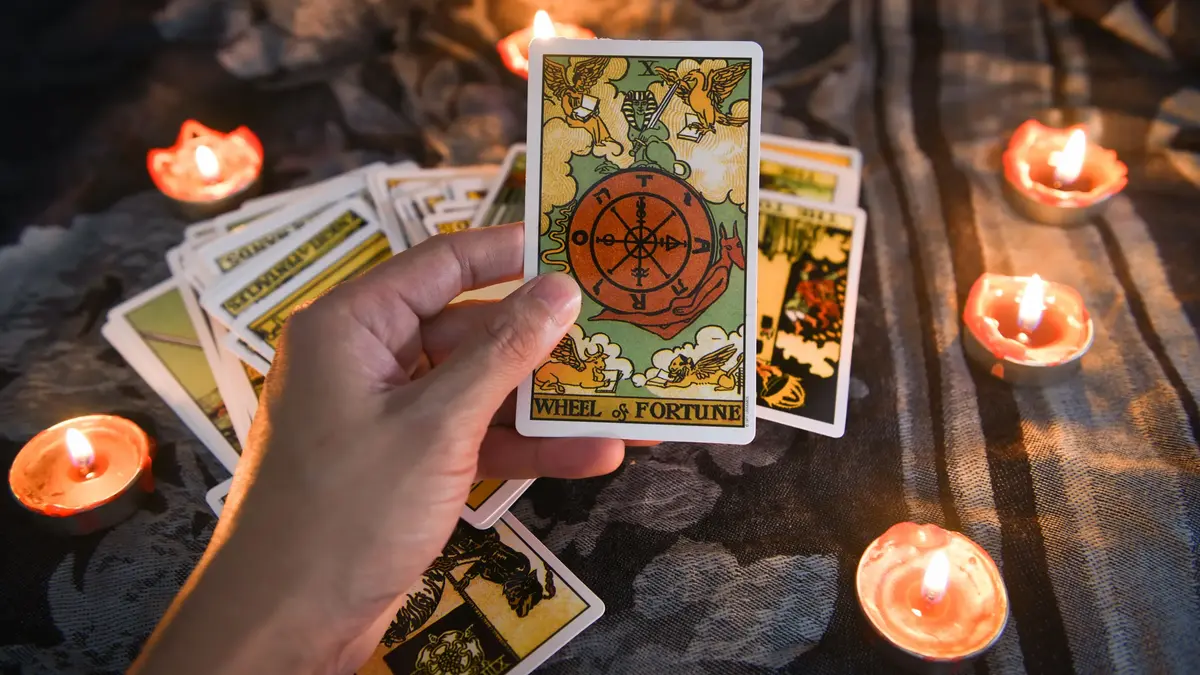
The science and study of the Tarot
Journalist and writer Amira Hassan al-Dasouki began her relationship with Tarot cards in 2015 through learning "energy healing", classified as a pseudoscience. According to her, it helped her "read a person's energy and determine the sessions they need for healing." She confirms that she has explored multiple sources, some of which see Tarot as beneficial on a psychological level or as a spiritual tool to confront challenges, treat anxiety, and other concerns.
Dasouki tells Raseef22, "Tarot is somewhat mysterious, but it is a means of communication recognized by cultures and religions that believe in the existence of angels or beings — from different realms — surrounding humans everywhere, making it a simple way to communicate with them instead of our language that is too primitive to them."
Many Tarot Facebook groups in Egypt adopt a religious tone and write religious phrases in their posts, as if the administrators and members are trying to distance themselves from the suspicion of kufr (disbelief) linked to fortune-telling and divination
Like Amira, Tarot sites deny that their practice is a form of "fortune-telling" or divination, but rather a means of helping oneself, through dialogue and self-discovery. This perspective is also shared by Houriya, who has been practicing Tarot for three years after regularly attending courses on "the science of energy". She says she began when she received "messages" that she told Raseef22 about, believing that her message is a form of "healing for those who need it."
Houriya, the owner of the Facebook group "The kingdom of illuminated vision, the Kotshena, and the spiritual Tarot", noticed people's love for Tarot, so she decided to pursue it professionally. She says, "I took many courses, including those related to energy. People who were initially skeptical when I read for them, were surprised when what I told them came true. Since then, I have developed a love for Tarot and started working in it at nominal prices."
A thriving business
Houriya has turned Tarot into a profession, and Amira Hassan al-Dasouki sees it as a "business". Friends who she used to "read for in a friendly setting" suggested that she turn reading Tarot cards into a career and a source of income. She now practices it through her channel "Tarot Sekhmet", and she says, "I was surprised by people contacting the channel to book readings with me. The idea of having my own business is both fun and exciting."
If mastered, this therapy-business can be lucrative, whether through achieving internet fame and followers, or financial returns. Prices observed by Raseef22 in a FB group say one session costs 150 to 400 pounds, while a group session costs up to 1,300 pounds
For Amira, she has fans and followers from Egypt and abroad, turning it into an "enjoyable project" for her and for them as well. She organizes "energy healing sessions," explaining that "the readings are psychological and revolve around what they need to improve their lives and energy."
If mastered, this therapy and business can be lucrative, whether by achieving fame with thousands of followers or generating financial returns, as seen in the prices observed by Raseef22 in a Tarot Facebook group. The price for a single session ranges from 150 to 400 Egyptian pounds, and the manager of Diwan Library says that the price for a group session now ranges between 400 and 1,300 Egyptian pounds.
This is how the Tarot has made a comeback, with cards that attract readers who seek to understand and learn them, even if it's from a few internet sites that are not free of charge.
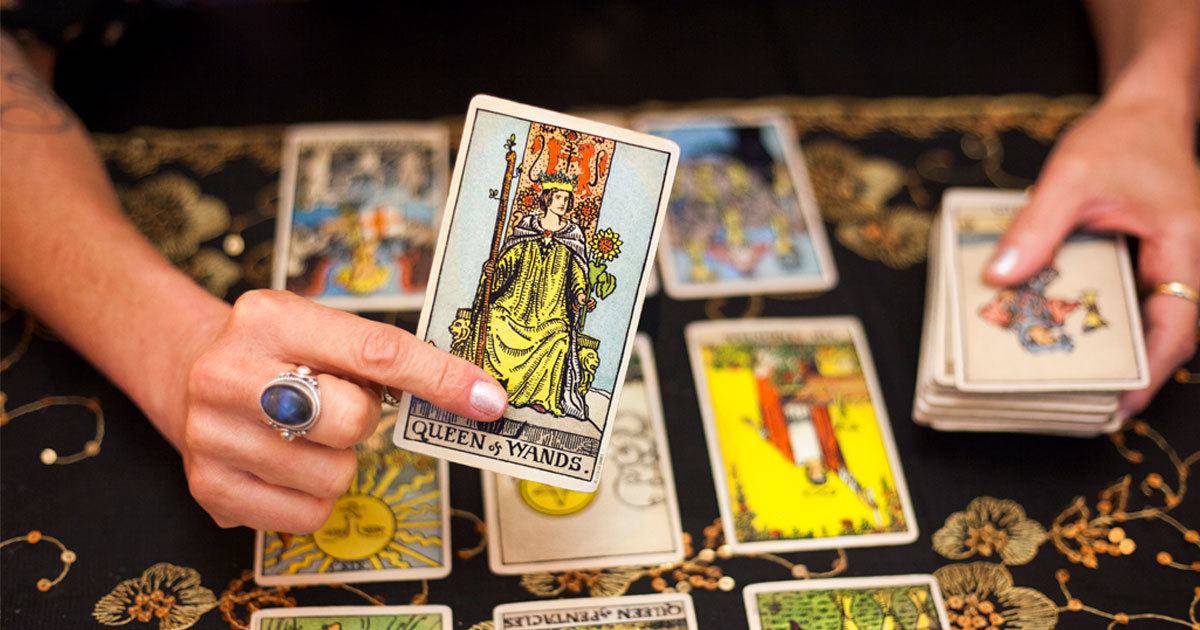
Accusations of blasphemy
The manager of Diwan Zamalek Library tells Raseef22, "We have started bringing in more books on Tarot, some of which are based on customer suggestions and requests. The majority of their interest in it is related to business, whether it's because they read it for others or because some of them hold onto the packages to sell them later in auctions."
In the digital realm, the Tarot is present on TikTok, which Houriya sees as "the future". She says, "About 80% of its users are teenagers, while YouTube has a broader age range. As for Facebook, it includes users of all age groups." Tarot groups on Facebook have caught attention due to their divergence from the common stereotype associated with it. Despite being perceived by many as "astrology and charlatanism" as well as psychic practices, many Tarot Facebook groups in Egypt adopt a religious tone, whether by carrying names with religious connotations like "rosary" or by requiring those who wish to join to write things like "prayer upon the Prophet" and the "La Hawla" recitation (aka Ḥawqala) in their joining requests. These groups also incorporate religious phrases in their posts, as if the administrators and members are trying to distance themselves from the suspicion of engaging in practices of kufr (disbelief) associated with fortune-telling and divination in Islam.
"People used to rely on scientific data to determine the outcome of things, but Covid proved that an unseen factor can change all possibilities and life plans. Thus, using alternative methods such as Tarot cards instantly attracted a great interest and demand"
In the face of attacks that include accusations of "blasphemy and threats of hell," Amira has chosen to ignore them and reaffirm her belief that it is a "gentle means for individuals to understand themselves and their surroundings." She completely rejects the notion that divination and energy-reading tools like Tarot are outdated and contradict the age of science and technology, saying, "Among the internationally acclaimed researchers are those who have challenged classical concepts. Science has begun to take different directions, including those related to the energy field surrounding the body."
As for Houriya, she says, "My family still considers Tarot as forbidden, and they demand that I give it up. But I love it because I believe it benefits people, even if it means alerting them to negative matters. My friends and my mother encourage me, and over time, people's reactions have started to change."
A window of hope
Like Fareeda, Houriya sees Tarot reading as "a means of guidance and spirituality, helping individuals overcome certain stages, improve their affairs, gain control over their emotions, and avoid harming themselves, in addition to how to deal with conflicts and animosity."
The matter is no different for Nour, who, after two experiences, states, "I see Tarot as something similar to what we do when we search for symbols and meanings in our dreams, but with Tarot, the response is immediate, even if it's not certain." She concludes, "The goal is to feel safe and reassured that the future holds better things, without getting caught up in the details. Not everything is bleak. This automatically leads me to disregard its warnings or predictions of problems, embracing the principle of 'being optimistic'. And that's what motivates me and drives me forward."
Raseef22 is a not for profit entity. Our focus is on quality journalism. Every contribution to the NasRaseef membership goes directly towards journalism production. We stand independent, not accepting corporate sponsorships, sponsored content or political funding.
Support our mission to keep Raseef22 available to all readers by clicking here!
Interested in writing with us? Check our pitch process here!
